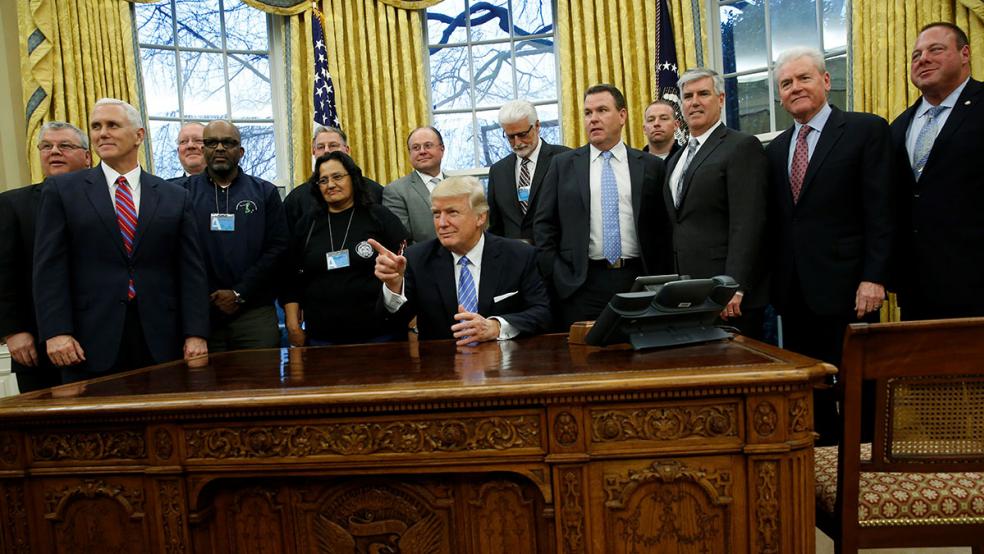Labor unions are, to put it kindly, not generally supportive of Republican politicians. There are exceptions of course, but Democrats historically have been seen as the party of workers and Republicans as the party of management. But on the Monday after he was sworn in, President Donald Trump made a show of meeting with top labor union leaders in the White House.
Reaching out to this traditional Democratic constituency was one of the more unconventional moves Trump made during a highly unconventional presidential campaign, and it won him a lot of unexpected support at the ballot box, even if it bore little fruit in terms of endorsements from labor leaders. However, by bringing them into the White House so early in his tenure, Trump signaled that he has an eye on union leaders’ future support.
Related: Trump Takes Aim at America’s Consumer Watchdog
There are definitely areas of overlap between Trump’s policies and those unions endorse. His withdrawal from the Trans-Pacific Partnership trade deal endeared him to some labor advocates, and his bullying of private companies that move jobs overseas has also been cheered by union officials.
However, congressional Republicans are at the beginning of an effort that could seriously strain whatever bonds Trump has been able to build with the movement.
Last week, Iowa Republican Rep. Steve King introduced a bill that would make so-called “right-to-work” policy federal law. Right-to-work laws, which have been proliferating at the state level for years, generally hamper the ability of labor unions to organize by making it illegal for labor contracts to include a requirement that union dues be paid as a condition of employment. This week, Missouri became the 28th state to enact some form of right-to-work legislation.
King’s brief two-page bill, co-sponsored by Rep. Joe Wilson (R-SC), would strike language from the National Labor Relations Act and the more obscure Railway Labor Act in a way that would effectively implement right-to-work nationwide.
Related: Trump May Be Sending More Jobs to Mexico Than He Saves
Writing at The National Law Review, Garen E. Dodge and Anna M. Stancu, attorneys with the firm Sheppard, Mullin, Richter & Hampton, note that this would likely mean the end of any meaningful labor movement in the U.S.
“Organized labor in the United States has experienced a steady decline in the last several decades, from a peak union membership rate of 35% during the mid-1950s to 10.7% in the year 2016. For the private sector, the decline has been even more precipitous: a mere 6.4% of private sector workers in the U.S. were members of a union in 2016.”
King’s bill, they say, “would likely deal a crippling blow to already weakened organized labor in the U.S.”
Trump has already gone on the record as a supporter of right-to-work legislation, and said as early as the Republican primary that he would sign a federal right-to-work bill into law if it reached his desk. But that was at a time when the idea of Trump winning the presidency was considered highly unlikely, and the idea of him doing so with Republican majorities in the House and Senate seemed laughable.
Related: Trump Continues to Cash In on the Presidency
Now, things look a little more real, and last week White House Press Secretary Sean Spicer reiterated Trump’s position.
“The president believes in right to work,” Spicer said. “He wants to give workers and companies the flexibility to do what’s in the best interest for job creators.”
Whether Republicans will be able to muscle a right-to-work bill through both houses of Congress is unclear, given the ability of Democrats to filibuster in the Senate. However, there are many endangered Senate Democrats running for reelection in states that are already in the right-to-work category who might be pressured to support it.
If it lands on Trump’s desk and he signs it, there would likely be no more cordial meetings between the president and labor leaders. But, given that in a right-to-work nation those leaders would see their influence greatly diminished, that might not matter to the president.





